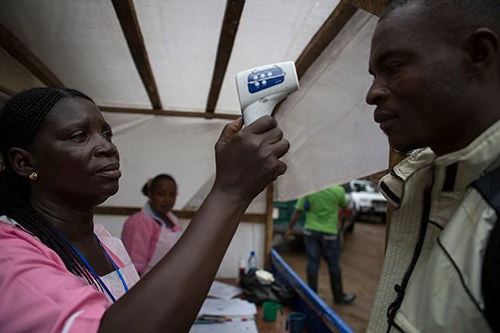
As we close the chapter on 2014, which is likely to be remembered in history as the “year of Ebola,” it is worth drawing some initial lessons for the future.
While the epidemic in West Africa is still evolving, despite progress made over the last few months, this global health crisis has made evident at a very high human, social, and economic cost the imperative of investing and sustaining disease surveillance systems as a priority “global public health good.”
Let’s be clear: globalization is not going to wither away, as it has been part of human history for millennia. Rather, we are and will continue to live in an increasingly interconnected world. While there are multiple benefits from globalization, there are also public health risks that are associated with demographic and economic pressures on ecosystems that facilitate the transmission of new pathogens from animals to humans. These zoonotic diseases account for 70% of emerging infectious diseases.
As we have seen recently with Ebola, an infectious disease of animal origin, and before with SARS and Avian Influenza, viruses jump and spread across borders without passports, wreaking havoc in their wake among unsuspecting populations, countries, and continents. This situation is becoming more challenging as the increased movement of goods, services, and people across the world facilitates the rapid spread of infectious diseases.
Perhaps one of the best antidotes for countries to be ready to detect early, identify rapidly, and respond effectively to future outbreaks like Ebola, is to learn from this and past health crises across the world and to adapt the lessons of what has worked well and not so well. Indeed, tapping into a vast global knowledge repository to help build resilient health systems should be seen as one of the great benefits of globalization that cannot be overlooked or simply wasted.
While the 2005 International Health Regulations (IHR) that came into effect in 2007 mandate that countries use existing national structures and resources to develop and maintain capacity for disease surveillance, reporting, notification, verification, response and collaboration activities, evidence from efforts to establish and expand regional disease surveillance networks -- such as those in the Mekong Basin, East Africa, Southeastern Europe, Southern Africa, or the Asian Partnership -- demonstrates that cooperative arrangements among neighboring countries can control cross-border disease outbreaks at their source and improve health outcomes.
As documented in the summary article* of a special issue of the Emerging Health Threats Journal**, the establishment of regional disease surveillance networks can add value by:
- Complementing global and country disease surveillance systems, particularly by helping address the lack of or limited surveillance capacity in countries, their limited diagnostic capabilities, and disincentives to reporting due to fear of economic consequences.
- Harnessing network power, not only to implement the IHR by upgrading national surveillance systems and supporting standardization of definitions, detection, and reporting, but more importantly by prioritizing building trust-based relationships that facilitate informal reporting and sharing of sensitive information, and enabling cross-border collaboration and the strengthening of national technical capacity.
- Helping national institutions adapt to changing conditions and needs associated with infectious disease spread, which require multinational, multi-sectoral, and multi-disciplinary solutions.
- Establishing networks that foster local leadership and action and collaboration among national public health institutions and research and training centers.
Moreover, working in accordance with “One Health” principles, the region will be in a better position to detect early, prevent, respond, and mitigate the impact of outbreaks of infectious diseases, both new and endemic, by linking public health, veterinary and environmental services, as well as to deal with anti-microbial resistance.
For a regional disease surveillance initiative to succeed and be sustainable over time, two critical ingredients are required (i) active leadership, engagement, and funding support of national governments and international agencies, coupled with continuity in the participation of individuals and institutions to gradually establish a basis of shared knowledge, trusted communication, and experience; and (ii) the ability to leverage and build upon existing governance structures and initiatives, and connect national public health institutions, training, and research centers in the region.
As the saying goes, a crisis poses challenges but also offers opportunities to learn and evolve. All of us in the global health community have an obligation not only to learn from the current Ebola crisis and what has worked elsewhere but to avoid, paraphrasing the Harvard philosopher George Santayana, being condemned to face unprepared similar crises in the future.
Follow the World Bank health team on Twitter: @WBG_Health
Related:
WHO International Health Regulations
*The Evolution and Expansion of Regional Disease Surveillance Networks and Their Role in Mitigating the Threat of Infectious Disease Outbreaks
**Special Issue of Emerging Health Threats Journal, Supplement 1, 2013
Letter to The Lancet: Ebola, International Health Regulations, and Global Safety
The Ebola Threat: A “new normal”?
Antimicrobial Resistance: A new global public health “ticking bomb”?


Join the Conversation